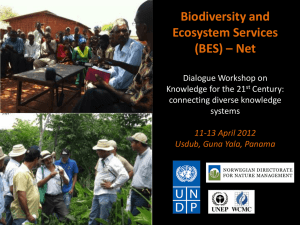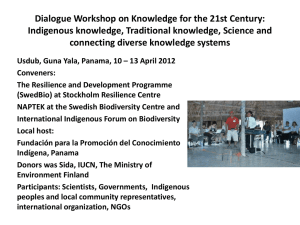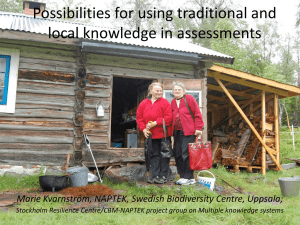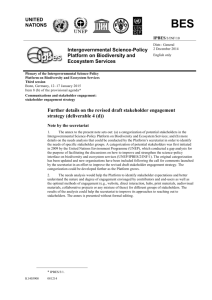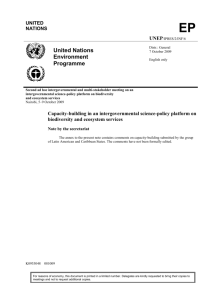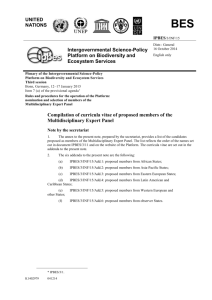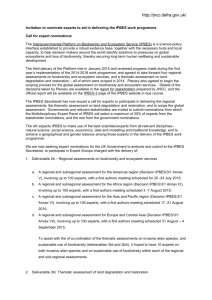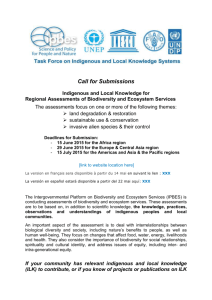Messages from the World Indigenous Network Conference for the
advertisement
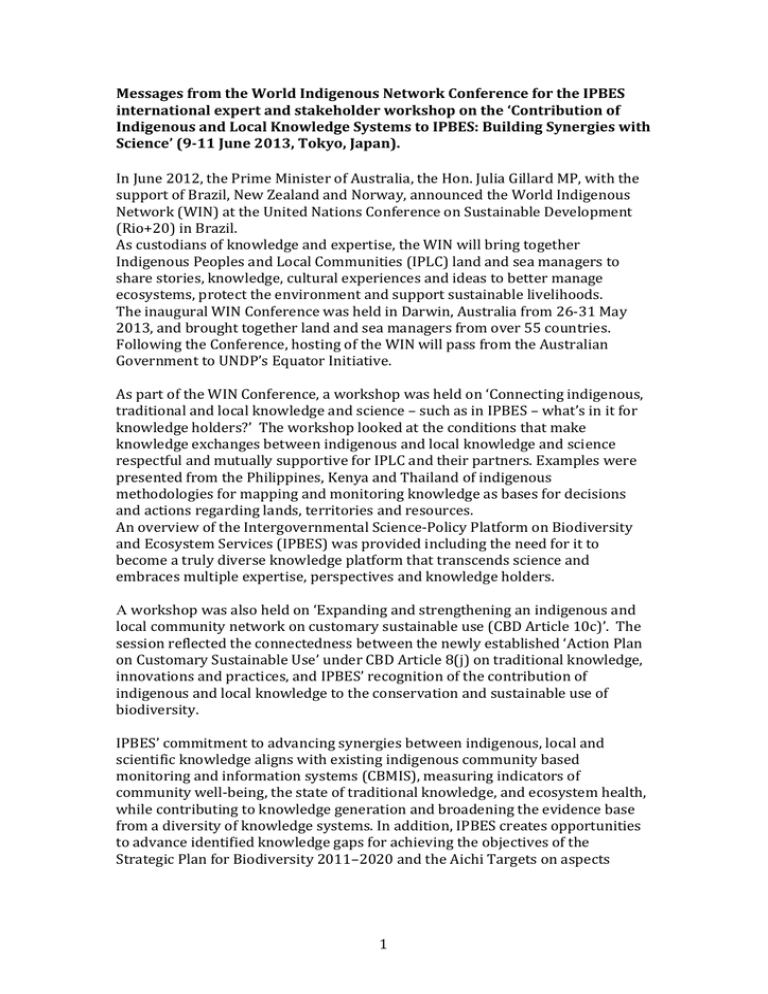
Messages from the World Indigenous Network Conference for the IPBES international expert and stakeholder workshop on the ‘Contribution of Indigenous and Local Knowledge Systems to IPBES: Building Synergies with Science’ (9-11 June 2013, Tokyo, Japan). In June 2012, the Prime Minister of Australia, the Hon. Julia Gillard MP, with the support of Brazil, New Zealand and Norway, announced the World Indigenous Network (WIN) at the United Nations Conference on Sustainable Development (Rio+20) in Brazil. As custodians of knowledge and expertise, the WIN will bring together Indigenous Peoples and Local Communities (IPLC) land and sea managers to share stories, knowledge, cultural experiences and ideas to better manage ecosystems, protect the environment and support sustainable livelihoods. The inaugural WIN Conference was held in Darwin, Australia from 26-31 May 2013, and brought together land and sea managers from over 55 countries. Following the Conference, hosting of the WIN will pass from the Australian Government to UNDP’s Equator Initiative. As part of the WIN Conference, a workshop was held on ‘Connecting indigenous, traditional and local knowledge and science – such as in IPBES – what’s in it for knowledge holders?’ The workshop looked at the conditions that make knowledge exchanges between indigenous and local knowledge and science respectful and mutually supportive for IPLC and their partners. Examples were presented from the Philippines, Kenya and Thailand of indigenous methodologies for mapping and monitoring knowledge as bases for decisions and actions regarding lands, territories and resources. An overview of the Intergovernmental Science-Policy Platform on Biodiversity and Ecosystem Services (IPBES) was provided including the need for it to become a truly diverse knowledge platform that transcends science and embraces multiple expertise, perspectives and knowledge holders. A workshop was also held on ‘Expanding and strengthening an indigenous and local community network on customary sustainable use (CBD Article 10c)’. The session reflected the connectedness between the newly established ‘Action Plan on Customary Sustainable Use’ under CBD Article 8(j) on traditional knowledge, innovations and practices, and IPBES’ recognition of the contribution of indigenous and local knowledge to the conservation and sustainable use of biodiversity. IPBES’ commitment to advancing synergies between indigenous, local and scientific knowledge aligns with existing indigenous community based monitoring and information systems (CBMIS), measuring indicators of community well-being, the state of traditional knowledge, and ecosystem health, while contributing to knowledge generation and broadening the evidence base from a diversity of knowledge systems. In addition, IPBES creates opportunities to advance identified knowledge gaps for achieving the objectives of the Strategic Plan for Biodiversity 2011–2020 and the Aichi Targets on aspects 1 related to traditional knowledge, innovations and practices, in particular Aichi Target 181. IPLC are important partners in, and contributors to, the work of IPBES and must participate in its work program. They are also decision-makers and implementers on the ground. IPBES offers an historic opportunity to address the marginalization of traditional knowledge through its recognition, respect and promotion, consistent with the UN Declaration on the Rights of Indigenous Peoples. The following messages, based on the two workshops and discussions with a range of stakeholders at the WIN Conference, have been developed for the IPBES international expert and stakeholder workshop being held in Tokyo from 9-11 June 2013. IPBES may wish to consider the following: - Conducting a pilot assessment to advance development of parallel mechanisms for evaluating or assessing knowledge for IPBES assessments, including aggregation of data across scales without compromising the quality of insights and legitimacy. The assessment should be performed by diverse knowledge holders, scientists and practitioners with experience of connecting knowledge systems. - Contributing to the development of methodologies for assessing and monitoring the indicators for the Strategic Plan for Biodiversity 2011–2020 and Aichi Targets, in particular Target 18, built on CBMIS and on the appropriate aggregation of data to the global level. We note that this is commensurate with the request from the CBD to IPBES whereby IPBES should ‘contribute to assessments of the achievement of the Aichi Biodiversity Targets’. - Mainstreaming experiences of methods for co-production of knowledge (e.g. community mapping, citizen science) in assessments and sharing via the capacity building function of IPBES. - In generating assessments, IPBES should seek evidence derived from diverse knowledge systems, recognise complementarities and identify pathways for cross-fertilization. Different knowledge systems, including indigenous and local knowledge, would be viewed as generating equally valid evidence, using different criteria of validation for data and information. Placing insights from multiple knowledge systems side by side will enable an enriched understanding of issues. This requires parallel sets of procedures to ensure the credibility and legitimacy of knowledge, and a diversity of mechanisms 1 Aichi Target 18: By 2020, the traditional knowledge, innovations and practices of indigenous and local communities relevant for the conservation and sustainable use of biodiversity, and their customary use of biological resources, are respected, subject to national legislation and relevant international obligations, and fully integrated and reflected in the implementation of the Convention with the full and effective participation of indigenous and local communities, at all relevant levels. 2 that facilitate communication, translation and mediation across knowledge systems. - IPLC should be encouraged and supported in risk assessments related to the sharing of knowledge. Free Prior Informed Consent should always be secured including through methodologies and guidelines for assessment. - Women and men have different roles, responsibilities and knowledge in managing biodiversity, resulting in different needs, priorities and concerns. IPBES should be cognisant about the role of women in indigenous and local knowledge systems and put in place mechanisms that ensure attention to gender specific knowledge and balance in all components of its work. - Given the current lack of representation of IPLC on the interim MEP, IPLC should be observers to the MEP – one man and one woman. Observers, including IPLC, should be able to nominate candidates for the MEP. Measures should be taken to ensure IPLC membership of the MEP after the interim phase. - Funding needs to be secured to ensure IPLC participation in IPBES on an ongoing basis. - Establishing a multidisciplinary and cross-cultural working group for bridging knowledge systems in an equal, legitimate, and transparent way that is relevant and useful for IPLC as knowledge and rights holders and managers of lands and seas. 3 Annex 1. Notes reflecting deliberations during the WINC Participation - How will IPBES facilitate greater participation of a diversity of knowledge systems and holders of knowledge in the IPBES process? Recognition of ILK - How will ILK be used in global assessments? How can it be scaled up? - IPBES should recognise best practice in producing knowledge. - Communities are doing their own research but this is not being picked up/taken into account by government and other researchers. In many cases, community maps are likely to be more relevant/applicable than researchers’ maps. - Co-production of knowledge is an important approach to create applicable solutions for problems in ecosystem management, adaptation to changing environmental conditions, or the loss of ecosystem functions. Knowledge holders of different knowledge systems could be involved in the process of formulating the respective research questions, in choosing the methods of data gathering and in drawing the conclusions. Validation - How will IPBES take into account and validate multiple knowledge systems? Validation is rarely a problem within a knowledge system, but validation across knowledge systems entails problems of legitimacy, equity, and compromised quality of knowledge. To realise the multiple evidence that exists across knowledge systems we need to shift from trying to find ways to translate knowledge into one currency, comparing and evaluating, towards recognising complementarities and identifying pathways for crossfertilization. Each knowledge system should be respected on its own terms and evaluated using internal mechanisms. We need a ‘Rosetta Stone’ for knowledge systems. - IPBES may wish to explore a ‘multiple evidence based approach’, which takes into account different criteria of validation that should be applied to data and information originating from different knowledge systems. Emphasising complementarity and placing insights from knowledge systems side by side will enable an enriched understanding of issues. Documentation - Like science, knowledge systems will continue to change and evolve. In this way, documented and publicly available knowledge represents knowledge at a particular point in time (static) and should not be relied upon as a complete picture - How will IPBES deal with gender specific knowledge? - There is a plethora of local knowledge which is also valid despite not having the same historical continuity and comprehensive identity as indigenous knowledge systems. 4 Sharing of knowledge at various scales - Countries need to celebrate and promote best practices examples of indigenous management and biodiversity conservation successes through IPBES e.g. savannah burning Australia. - Biodiversity hotspots are often closely correlated with sacred sites/spiritual hotspots. - Certain individuals can act as cultural bridges and efforts should be undertaken to identify these individuals. - There is a need for capacity building in best practices and general behaviour for facilitating reciprocity in sharing across knowledge systems. Capacity building - Local knowledge is complex, specific, localised – however, there are parallels and knowledge can be adapted and people can learn from one other. - How can IPBES learn from and create synergies with existing community based monitoring and information systems? - Indigenous Peoples are starting to use new technologies as part of their daily activities. Supporting implementation and reciprocity Acknowledging that IPBES will provide policy-relevant information, but not policy-prescriptive advice: - Can IPBES help support policy implementation? Or perhaps identify what the barriers are to implementation? - IPLC are interested in how IPBES will deal with reciprocity whereby there is a complete circle leading to changes on the ground. There need to be pathways to provide knowledge to the community level. - Mechanisms need to be developed for implementation at the national level linked to implementation at the grassroots/community level. - There should be reciprocity at the methodology development stage so that it also benefits the communities. - It’s often very difficult to find support for community initiatives. What role can IPBES play in this? Can it call for funding? - How will IPBES link to the 8j work being done on indicators (linguistic diversity, traditional occupation and land use change in indigenous territories)? What’s being discovered through the indicator work is that a lot of the information is being lost before it reaches the global level. 5
